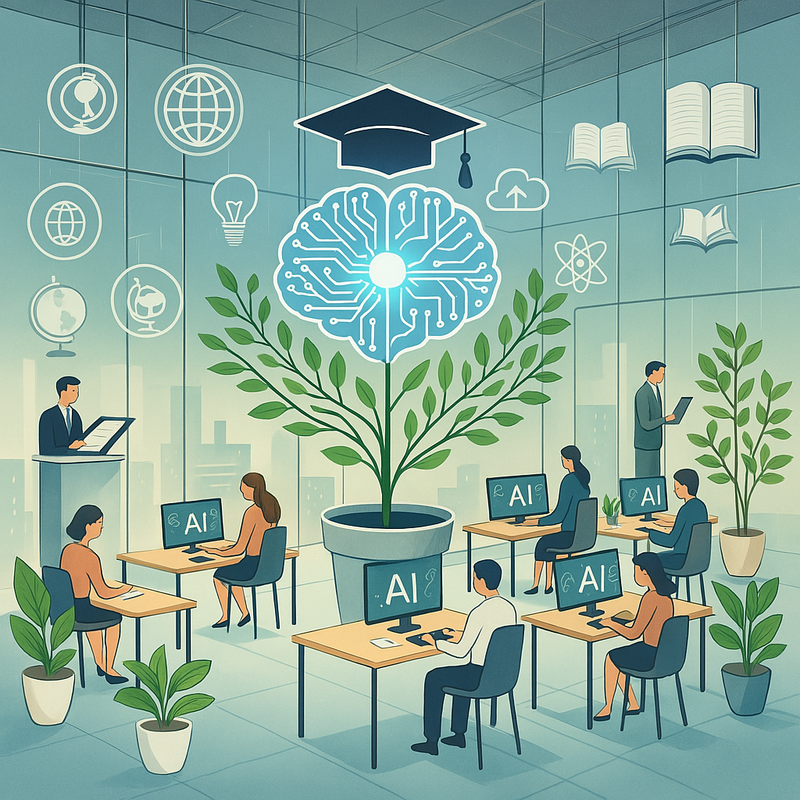The Mind at Risk: How AI and Market Pressures Are Reshaping Higher Education
Input
Modified
Students are outsourcing their thinking to AI. Universities are prioritizing efficiency over intellectual depth. The future of higher education hinges on how well it adapts to these twin pressures.
In an era marked by accelerating technological change and profound institutional shifts, the university, a long-standing symbol of intellectual rigor and discovery, finds itself at a crossroads. With the rise of artificial intelligence tools like ChatGPT, the academic world is confronting unprecedented questions about thinking, learning, and the role of the human mind. Simultaneously, economic and political forces are reshaping universities into streamlined systems that often value output over insight. At stake is more than curriculum or budget; it's the very soul of higher education.

From Curiosity to Queries: The ChatGPT Generation
Once upon a time, inquiry began in silence: a trek through library stacks, the patient flipping of card catalogs, the internal wrestling with half-formed questions. Then came the internet. Yahoo and Google revolutionized how students searched for information, but the thinking, at least, remained theirs. Now, a new generation increasingly turns to artificial intelligence not just for facts, but for answers. According to recent reports, university lecturers across the globe have noticed a disturbing trend: students have stopped thinking for themselves.
Instead of framing questions or exploring interpretations, many now treat tools like ChatGPT as end-all oracles. A professor quoted in a recent University World News piece noted that a reflex has replaced the act of wondering to prompt. Students no longer pause to consider whether they understand a concept; they simply ask the AI for clarification. "It’s not just about plagiarism anymore," one academic warned. "It’s about the erosion of thought."
This transformation has led to a re-evaluation of what learning even means in the age of machine assistance. Critics argue that when every problem has an instant answer, students are deprived of the struggle that cultivates real understanding. The learning process should be messy and effortful, rather than merely transactional. However, universities, many of which are under pressure to modernize and optimize, are now faced with a dilemma: how to balance the advantages of AI with the need to maintain intellectual rigor.
Higher Education’s Efficiency Trap
As students increasingly rely on generative AI to do their thinking, higher education itself has not been immune to the allure of automation and efficiency. A growing body of analysis reveals how universities have started to resemble corporate enterprises more than centers of critical inquiry. The second report in the series highlights a larger trend: institutions optimizing their operations, chasing performance metrics, and prioritizing revenue generation over academic exploration.
Faculty members lament the shrinking space for deep mentorship, interdisciplinary research, and philosophical inquiry. Curricula are streamlined for maximum employability; their ROI rather than intellectual contribution evaluates departments. As one education analyst bluntly put it, "We’ve turned universities into factories."
This shift reflects broader economic and political pressures. Governments demand outcomes. Parents want value for tuition dollars. Administrators measure success in terms of retention, graduation rates, and career placement. And amid this sea of spreadsheets and dashboards, the university’s traditional mission, cultivating minds, challenging norms, and expanding the human experience, has grown faint.
For some, this is a necessary evolution. In an age of global competition, universities must be leaner, more responsive, and more practical. But for others, this efficiency drive threatens the soul of education. When speed and productivity become the only metrics that matter, there’s little room for wonder, doubt, or dissent, essential components of a truly transformative education.

Adapt or Abdicate: The Future of the University
The core question, then, is whether institutions can evolve without compromising their integrity. The third report offers a more balanced view: the problem is not AI itself, nor even efficiency. It is how, and why, we implement them. Universities that approach technological tools with critical thought and deliberate design are better equipped to maintain academic integrity. Those who see ChatGPT merely as a shortcut, or worse, as a cost-cutting device, risk reducing education to little more than content delivery.
Some universities are rising to the challenge. They’re developing AI literacy courses, encouraging students to critique and question machine outputs rather than accept them blindly. Others are building policies that recognize the inevitability of AI use but frame it within ethical and pedagogical guardrails. In this view, tools like ChatGPT are not threats to thinking; they are opportunities to redefine what thinking means.
This is the tension that now defines the academic frontier. Will AI become a crutch or a catalyst? Can universities resist the urge to streamline at the cost of substance? The way forward lies in reimagining education not as a product, but as a process, one that values questions as much as answers, and learning as a journey, not a destination.
Ultimately, how institutions respond to these pressures, technological, economic, and ideological, will shape not only the minds of future generations but the very role of the university in society. The challenge is immense, but so too is the opportunity: to reclaim a vision of education that is both profoundly human and fully equipped for the 21st century.














Comment